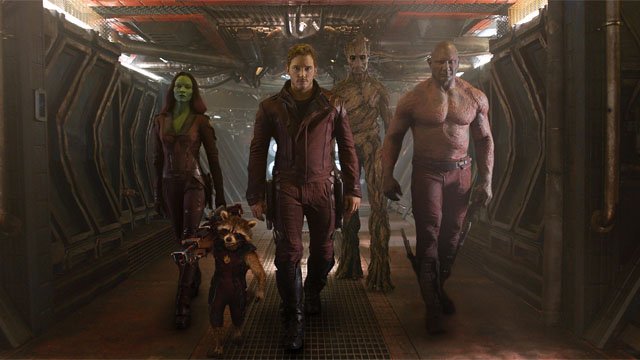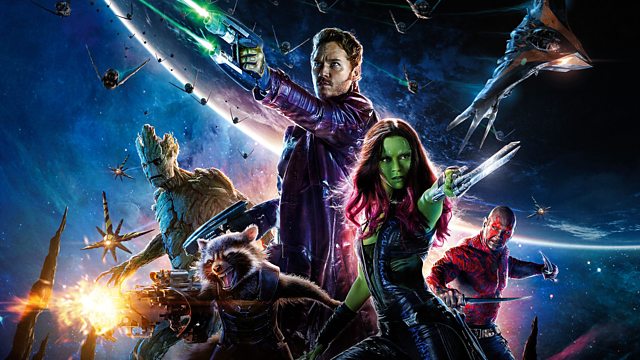To celebrate Avengers: Endgame’s release, we’re taking a look back at the entire MCU. Entry by entry. Our goal with this retrospective is to trace the footsteps of Marvel Studios. And in doing so, to understand the decisions made along the way to becoming a Hollywood powerhouse.
Odd One Out

After the outstanding critical and commercial success of Captain America: The Winter Soldier, Marvel Studios’ next release looked to break the mold. Arguably, The Winter Soldier was Marvel’s best movie up to this point. Unlike other Marvel movies, Guardians of the Galaxy had the difficult task of justifying its existence. Burdened with expanding the cosmic side of the MCU tenfold, it was also the most obscure property Marvel ever adapted.
It’s a miracle that a movie like Guardians of the Galaxy even exists at all. There are a myriad of reasons why any studio in their right mind would laugh off a film like this. But that’s exactly why this film could surprise fans and critics alike. Marvel loves to shake up the status quo , and that’s exactly what they did with Guardians of the Galaxy.
Getting With the Program

The idea to adapt Guardians of the Galaxy came from an unexpected place. Marvel originally intended to place precedence on their more popular characters. Then the studio started an experimental writing program in 2009 to develop secondary characters and properties for potential feature films. Marvel brought in a handful of up-and-coming writers with no produced work on their resume. The writers were given an office and the choice of several lesser-known properties to develop. One of the writers, Nicole Perlman, had an interest in telling a fun, colorful and grand science fiction story. So she naturally gravitated towards Guardians of the Galaxy as a way to fulfill that urge.
Perlman’s selection eventually put Guardians of the Galaxy into active development. Marvel initially wavered on which run of Guardians to adapt in the screenplay, but Perlman favored Dan Abnett and Andy Lanning’s 2008 reboot in the comics. The studio told her to “take a whack at it,” and Perlman spent the next two years of her time in the program working on the script. Considering the lack of preconceptions about the property, Perlman was given “an enormous amount of creative freedom,” with the only requirement being to “come up with a good story.” By the end of her run, Perlman had gone through roughly forty different versions.
Infinite Possibilities

By the time Perlman concluded her tenure in the program in 2011, her script rebooted the backstory for Peter Quill. She transformed the McGuffin into one of the Infinity Stones, and made Thanos the primary antagonist. The studio eventually lured Perlman back as a freelancer to do even more work on the script that same year. By this time, she realized that Marvel was serious about including Guardians of the Galaxy on their film slate. Thanos appeared in the post credits scene for The Avengers that next year, and revealed the the MCU was finally expanding its cosmic side. Marvel officially announced Guardians of the Galaxy at their Comic-Con 2012 panel, confirming an August 2014 release window for the film. With this suddenly ticking clock, the studio now had to quickly find a director for the project.
A month later, Marvel named an unexpected choice to helm the film in the form of writer/director James Gunn. Future MCU directors Peyton Reed, Anna Boden and Ryan Fleck were also in the running, but Gunn’s distinct and specific style won out. In hindsight, only a filmmaker as irreverent and unique as Gunn could have made this movie work. The director of a few low-budget features like Slither and Super had the writing and story prowess to perfectly fit something so offbeat. Pre-production officially began with Gunn’s hiring only a few weeks later. But there was a problem: Gunn really didn’t really like Perlman’s script.
Gunn Control

Marvel intended for Guardians of the Galaxy to emulate the space opera subgenre. Gunn made it feel like an amalgam of traditional space epics “mixed with the grittiness of Alien.” According to the filmmaker himself, Perlman’s script “didn’t work” for him, so Gunn massively rewrote it. He later contested Perlman’s writing credit, though she laid much of the groundwork by the time he had joined the project.
Gunn ultimately changed what the story was about. He rewrote character arcs, and added Ronan the Accuser as the villain. Additionally, he brought elements like Peter’s Walkman and added the irreverent sense of humor. Perlman acknowledges that Gunn’s choices made Guardians of the Galaxy accessible to audiences. However, WGA rules favor first writers because of their influence in selecting characters and developing the concept. That’s why Perlman became the first female screenwriter to get a credit in the MCU. She is also the only scribe to have their work produced from the writing program. Gunn continued to hone the script into production, although he essentially kept the story the same as his initial draft. After Gunn completed an initial pass on the screenplay, his attention turned to casting.
Pratt Falls up

Guardians of the Galaxy was a first for Marvel in the sense that they had to cast not one, but five key roles in the film. And two could only be created using CGI. Actors like Joel Edgerton, Jim Sturgess and Lee Pace tested for the lead role, but Marvel eventually cast another unexpected choice in Chris Pratt. Known for his comedic chops in Parks and Recreation, Pratt looked like anything but leading man material. Regardless, Pratt had steadily been giving great supporting performances in award movies like Moneyball and Zero Dark Thirty. Pratt bulked up for the role, and his witty take on the material demonstrated his ability to become a full-blown movie star.
Drax and Gamora came next, with the roles given to more surprising choices – WWE veteran Dave Bautista, and Zoe Saldana. John C. Reilly, Glenn Close and Benicio Del Toro filled out the rest of the cast.
We Are Groot

Guardians of the Galaxy eventually entered production in mid-2013 with Ben Davis behind the lens. James’ brother Sean Gunn stood in for the physical movement of Rocket on set, but Bradley Cooper signed on as his voice in September 2013. Cooper’s Goodfellas-style intonation worked perfectly. The sarcasm that he brought to the character made him that much more relatable.
Then came Vin Diesel, who was cast as the voice of Groot. The notoriously macho image of Diesel sounded like an unexpected choice, considering the sweet nature of the character, but somehow it fit. Both of these characters are important because they not only represent some of the most nuanced VFX to date. The film simply wouldn’t work if Groot or Rocket weren’t convincingly integrated into the movie.
A Kind of Magic

Remarkably, Guardians of the Galaxy works almost entirely as a standalone movie. Still, Marvel Studios naturally had to do some housekeeping for the larger universe. The first full-fledged cosmic outing had to also lay the groundwork for Phase Three of the MCU. The previous movies hinted at the Infinity Stones, but this film confirmed them and formally introduced Thanos by name.
Thanos’ original inclusion in The Avengers was essentially an afterthought. However, Thanos shaped up to be the Emperor to Loki’s Darth Vader. Gunn admits that his including the character did more for the MCU than it did for his actual movie. Regardless, the decision to add the Mad Titan paid off down the line. Marvel cast Josh Brolin only a few months before the film’s release, thereby setting all the pieces in motion for something much larger.
Phase Three as we know it wouldn’t exist without this movie. It’s ironic because one of the MCU’s most important and influential movies wasn’t even originally supposed to be made. The film broke new ground for Marvel in many respects, but Guardians of the Galaxy ultimately just tells a good story. It’s not perfect , but the tenth film in the MCU oddly represents the promise of the larger cosmic universe that was fulfilled in Phase Three. It’s also a rollicking good time to watch and it never loses its magic.
Related:
Captain America: The Winter Soldier – MCU Retrospective Part 9
Thor: The Dark World – MCU Retrospective Part 8
Iron Man 3 – MCU Retrospective Part 7
The Avengers – MCU Retrospective Part 6
Captain America: The First Avenger – MCU Retrospective Part 5
Thor – MCU Retrospective Part 4
Iron Man 2 – MCU Retrospective Part 3




